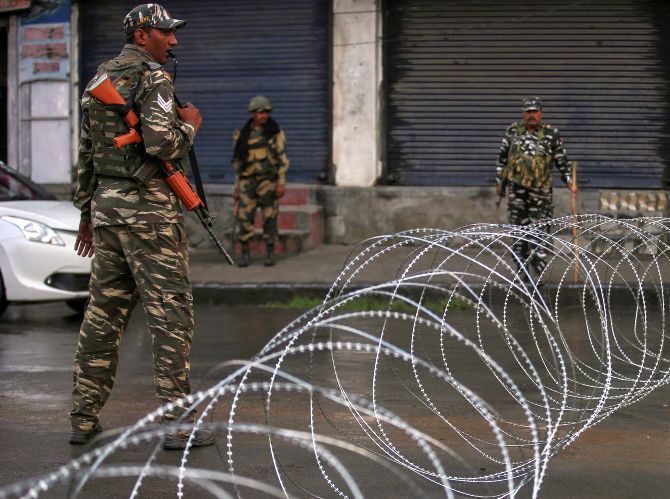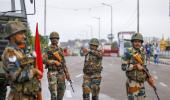All things taken into consideration, the Taliban statement on Kashmir portends trouble ahead. The Taliban is notorious for doublespeak and when it says there is no link between the Kashmir issue and the Afghan settlement, the opposite must be taken into account as well, points out Ambassador M K Bhadrakumar.

The statement issued by the Taliban on Thursday (external link) regarding the situation surrounding the state of Jammu and Kashmir merits serious attention.
The statement recalls media reports on the abrogation of the special status of J&K by the Modi government, the deployment of additional troops in the state, and the lockdown in the valley that have created "difficulties and hardships for the Muslim population."
The Taliban expresses "deep sadness" over these developments and urges both India and Pakistan "to refrain from taking steps that could pave a way for violence and complications in the region and usurp the rights of Kashmiris."
The statement calls for international intervention to prevent insecurity in Kashmir.
The OIC, Islamic countries and the UN have been singled out for reference.
Taliban envisages that outside intervention could encourage India and Pakistan "to prevent the spread of crisis and resolve the issue in a calm and composed manner."
The statement concludes by rejecting any hypothesis that the Kashmir issue and the Afghan problem are linked.
It underscores that "the issue of Afghanistan is not related" to Kashmir and, furthermore, Afghanistan should not be "turned into the theatre of competition between other countries."
It is extremely rare for the Taliban to take a stance on the Kashmir issue.
In fact, I cannot easily recall such an explicit statement by the Taliban in all its 4-decade old existence, dwelling on "the rights of Kashmiris."
The Taliban claims to be Afghan-centric and maintains that it has no agenda towards the surrounding regions of Central and South Asia (although it had recognised the insurgents in Chechnya in the late nineties as the legitimate government.)
Without doubt, the leitmotif of the Taliban statement is the assertion of its concern and profound sense of involvement in the welfare of the Muslim population in J&K.
This has grave implications for India's security.
Could the Taliban have issued such a statement when India-Pakistan tensions are running high without the prior approval -- or even directive -- from the high command in Rawalpindi? Impossible.
To be sure, the birds are coming to roost.
At least six months ago, when it became crystal clear that the Trump administration had every intention to end the Afghan war and walk toward the exit door, Delhi should have done contingency planning.
But despite repeated warnings by this writer on several occasions, Delhi was delusional in its belief that jointly with its Afghan partners, the apocalypse can be averted in the Hindu Kush.
Who or what gave the Indian establishment such confidence remains a mystery.
Today, on the contrary, the peace talks between the United States and the Afghan Taliban have reached the home stretch.
The optimism in the most recent remarks (external link) by the US Special Representative on Afghanistan Zalmay Khalilzad conveys the impression that an agreement is imminent -- possibly, during this month itself.
The Taliban spokesmen also voice satisfaction that an understanding with the US has been reached.
While the terms of the agreement remain confidential, it is a fair guess that an orderly withdrawal of the US and NATO troops in Afghanistan can be expected.
President Trump has been explicit on troop withdrawal before the November 2020 election.
The sticking point in the negotiations in Qatar was the Taliban's insistence on a total US withdrawal.
That was partly sophistry aimed at creating a key role for Pakistan at the peace table.
There is reason to believe that Pakistan has gone through the motions of finessing the Taliban's obdurate stance and the latter may show flexibility to allow some sort of US presence to continue.
What form it takes remains strictly between Washington and Islamabad.
Of course, Trump has vowed that the US would have a "strong intelligence" presence in Afghanistan for the foreseeable future.
And, without doubt, Pentagon regards a long-term US military presence in Afghanistan to be critically important as an underpinning of American global strategy, especially its dual containment policy toward Russia and China.
Thus, the dynamics and future trajectory of the US-Pakistan strategic partnership will also depend on Islamabad's role as facilitator of continued American presence in Afghanistan.
The tentative resumption of US military aid to Pakistan suggests that Washington is satisfied with the current level of Pakistan's cooperation and optimistic about future prospects.
On the other hand, continued US presence and involvement in Afghanistan serves Pakistan's interests too, since a future Taliban regime in Kabul will need international assistance to cope with the country's reconstruction and governance, and, secondly, an American presence in the region is particularly useful for Islamabad at present to ward off India if push comes to shove in J&K.
Meanwhile, as by far the best organised Afghan group, Taliban has a decisive edge over other rival groups.
Therefore, a Taliban takeover in Kabul at some point in a very near future is entirely conceivable.
An anti-Taliban resistance as in the late nineties is not to be expected.
Suffice to say, an Islamist regime based on Shariah and enjoying international legitimacy is taking shape -- not only in Afghanistan but in the regions of Central and South Asia as a whole.
This would have profound implications for India, especially J&K.
Even if Taliban doesn't change course to overtly become part of the global jihadi movement, its triumphal victory over a superpower itself creates an aura around it that will radiate energy far beyond Afghanistan's borders.
Evidently, India has a lot to worry about if the Islamist militancy radiating from Afghanistan spreads to the Kashmir region.
The US diplomatic strategy to harmonise with the regional states individually during the peace process has worked brilliantly well for American interests.
But it lulled India into complacency.
The point is, the US didn't need any grand bargain with regional states such as India, since it was focused almost exclusively on its self-interests and its bottom line was that there was no regional initiative to challenge its lead role in the Afghan peace process.
Regional countries such as Russia and Iran accordingly made a beeline for the Taliban -- principally, Russia by seeking Pakistan's good offices to gain access to the Taliban, and Iran developing its own channels of communication with the Taliban.
In this dismal scenario, unsurprisingly, the US has come to regard Pakistan as its indispensable partner.
That, in turn, puts Pakistan in a commanding position.
China is already Pakistan's "iron brother".
Russia too has pinned hopes on an engagement of Pakistan that would help it wield some influence with a future Taliban regime in Afghanistan so as to protect its "soft underbelly". (Whether such fond Russian hopes are realistic, time only will tell.)
All things taken into consideration, therefore, the Taliban statement on Kashmir portends trouble ahead.
The Taliban is notorious for doublespeak and when it says there is no link between the Kashmir issue and the Afghan settlement, the opposite must be taken into account as well.
The Taliban seems to be conveying a convoluted message to the Indian security establishment that we shouldn't impede any further its triumphant march to power in Kabul in the fateful weeks ahead, even as an interim government gets formed and it gains the decisive upper hand on the political chessboard as by far the best organised Afghan group.
This implicit warning -- that it is up to the Indian establishment to link Kashmir (Pakistan) and Afghanistan -- must be heeded.
India really is not a participant in Afghanistan's fratricidal strife -- it never was and never should have been.











 © 2025
© 2025